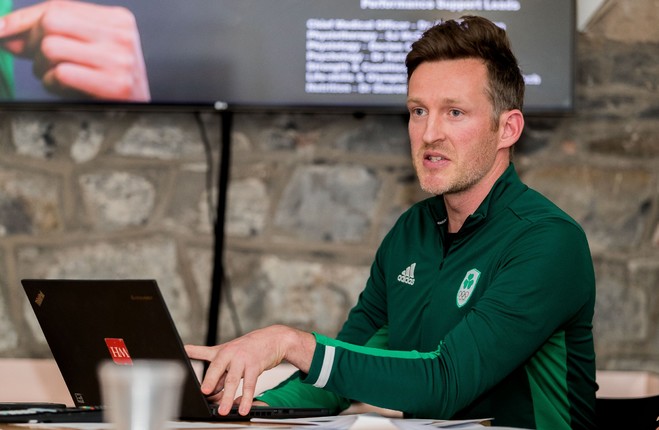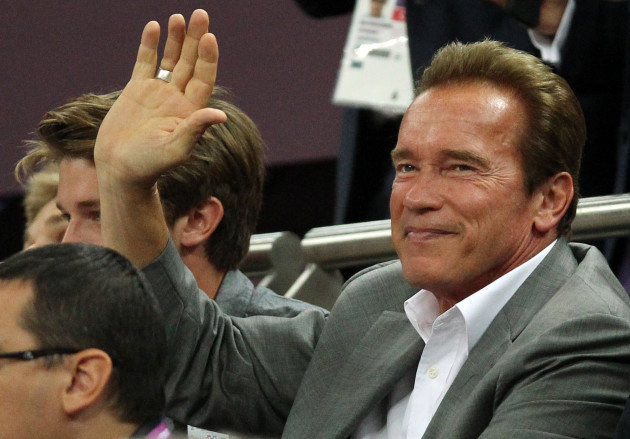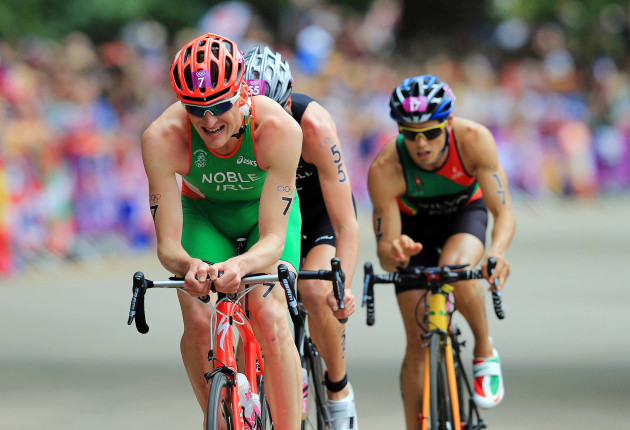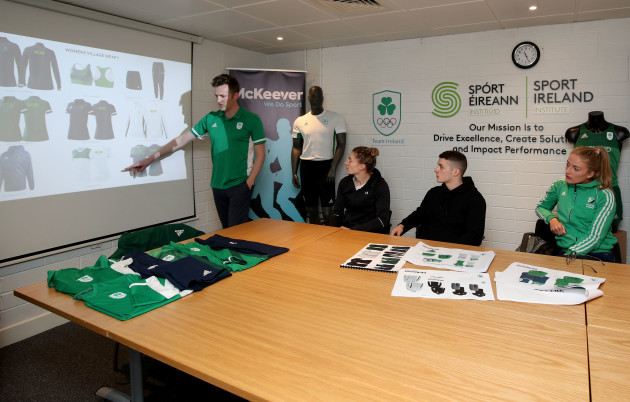Updated at 19.44
FOR SOME high-level athletes, finishing up elite sport does not necessarily bring an end to an intense lifestyle.
Gavin Noble was able to reflect with satisfaction on a good career.
The 38-year-old Enniskillen native spent more than a decade competing in triathlon, and reached the pinnacle towards the end of his time in sport, qualifying for the 2012 Olympics and ultimately coming a creditable 23rd overall in London.
“Getting to the Olympics wasn’t about me any more. It was more about everyone around me,” he tells The42.
“I don’t think there’s a lot of pressure, there’s almost a weight off your shoulder when you have qualified. The hardest thing is getting there in some regards.
“I could actually prepare myself for one day and one race and that for me is the most exciting part of it, because I was going around the world every weekend trying to pick up points. It was the same for a lot of Irish Olympians — I could sense a relief at having qualified.
There’s an awful lot of pressure on the athletes to qualify the spot, because on the back of that, you’re impacting someone else’s livelihood and job and there’s funding for the performance team, so there is a little bit of pressure in that sense and there’s a bit of relief that you’ve almost secured funding for the sport in the next cycle based on your own efforts.”
With his event taking place shortly thereafter, Noble didn’t go to the opening ceremony, but once he had finished competing, the triathlete was determined to soak up as much of the experience as possible.
“I was sitting courtside next to Arnold Schwarzenegger watching gold-medal basketball. I was in the Olympic Stadium every night watching athletics. So I made a real effort. I watched Katie Taylor’s gold-medal fight. So all those things sort of live with you. We do a lot of work now [in the Olympic Federation of Ireland] with the team and encourage the athletes to try to stay on and savour many other events. You just don’t get back time.”
Noble had been putting off a knee operation that he underwent after London 2012. While recovering from that over a few months, he began to consider life after sport.
“I had to decide the direction I needed to go. Four years is a long time. I was 32 at that point, so being 36 and still on that road and still going race to race, still living that nomadic lifestyle is not something that would have necessarily appealed to me.
“Even when I was injured and getting my knee done, I was already making that plan, I had an exit strategy or I was trying to see an opportunity that I could exit it graciously rather than stopping the sport when I was unfit, or not getting the results and falling down the rankings. I was lucky enough that that’s how it all panned out.
“You struggle with that: ‘What am I going to do now?’ Or depending what age you are, or family circumstances, or how much money you’re making, all these things weigh on people’s minds. It was something in your father and mother’s mind all of the time, what are you going to do next. In the back of your mind, you’re always wondering.
I wanted to become a full-time athlete when I was 19, but my father wouldn’t necessarily support that, so I had to go to uni for four years in Scotland. Then I didn’t progress in sport, because I was doing uni. But in the long run, 10 years later, you’re happy it took you where you wanted to go in terms of sport. But those four years set you up for your degree and the rest of your life.
“Sometimes, with athletes today, they rush and they don’t value education as much to think about where am I going to be in 15 years and what’s going to be on my CV, because not everyone makes it to the games. My mum and dad were both teachers and they had that foresight.
“I studied sports marketing at university. It sort of helped me, because when you’re in an individual sport, you rely a lot on sponsorship. I think I was clever enough the way I handled that. I eventually moved into sponsorship. I was sponsored by a bike company, I was 20th in the world. Why would a bike company sponsor me when they’re already sponsoring the guys winning? I was sort of smart in a way where it wasn’t about what they could do for me, but what I could do for them. My contract was based on me writing blogs back in the day and doing bits for their website. Then I had more or less a job. Whether or not I knew it at the time, I was always building a resume when I was in sport.”
Since retiring from high-level sport, Noble’s jobs have included being global sports manager for mountain and road bike triathlon. He spent three years in this US-based role before returning home and working for Wilson Hartnell, a PR and Communications Agency in Dublin, for whom he served as head of digital content. More recently, he has founded his own business, HupHup.ie, balancing that with being the Olympic Federation of Ireland, Deputy Chef de Mission.
I was in between jobs at one point recently and I met a recruiter,” Noble recalls. “I asked her what does it mean to be an Olympian. Your coaches tell you ‘if the Olympics is on your CV, you’ll get jobs,’ but she was very real in that, if you want a marketing job, 10 people in the same 10 years you’ve been doing your sport, they’ve been doing the marketing role. So in the real world, the Olympics is nice to have, but it doesn’t necessarily get you anywhere on the job ladder. That’s sort of a fallacy that some people think just because I played for Ireland means I can get a job wherever I want.
“It’s hard for the athlete then to understand, because you go from a point of always being given something where you’re sort of the centre of attention. You go from having things a little bit easier and people wanting to do stuff for you to having to go into the real world — you’re starting again, it’s the bottom. You don’t have a head-start on anyone just because you’re in sport. In fact, you’re starting from way back. Even in terms of money, you don’t walk into an 80 grand job. You have to spend five or six years on the ladder, like anyone else, to get there. That’s a hard thing for an athlete to take. You’ve been lauded for a few years. People were booking your flights and giving you money in sponsorship. Then you’re just another person in the office and the world becomes really big then. Your little sport, you’re not in that world anymore, so not as many people know you, who you might think did. You’re just another person in the office and no one really cares what you did or how fast you ran.”
Finding himself lacking in terms of experience by comparison to his work peers, Noble attempted to compensate with adapting the same determined mindset that enabled him to succeed in sport.
“I think the biggest thing that’s stood to me comes from sport, I didn’t ever enter the workplace knowing what a 9-5 was. I never knew what clocking-in time was, or taking holidays. Whenever I joined the workforce, I’d be over-working seven days a week. The work ethic I was able to take from sport made me progress through the ranks of different jobs a lot faster. But I did miss out and I had to learn by myself in my own time. Basic stuff like how to do Excel or Powerpoint. Stuff like that you don’t get as an athlete, they’re the basic things you need in the workplace. Again, me being competitive, I would have spent hours by myself in my spare time trying to teach myself these things. The competitive drive from being an athlete makes you competitive in work.”
He continues: “Because I was working in America and I was still on the scene, I never had downtime. I didn’t find I was going home at night and spending a lot of hours wondering. I was working until three in the morning because it was a global job and it was across different time zones.
“The thing I missed the most [about sport] was just being fit. When you work for a bike company, you ride the bike, but I definitely went through a period where you put on a bit of weight, or I had a kid, so you put on the dad 5 kilos. You get to a point where you want to exercise, but you find ways of not doing it, because you’re so consumed by being competitive and wanting to do work.
“I would struggle with taking time out of work and finding time for myself to keep healthy, or find time to switch off. I’m a divil for keeping the phone on and answering emails. Through my own business and working for the Olympic team, I would never have a day off. I would never have a day off when I was an athlete either, because I was in triathlon doing three sports.”
Noble admits this obsessive approach to a job is not necessarily healthy and achieving a work-life balance is something he is still trying to master.
“I’ve a wife and two kids now. You sort of recognise it. But from me being multi sport, it’s just who I am. My phone is always on. Our company is 90 athletes and with the OFI, it’s ramping up. I wouldn’t do it if I didn’t enjoy it, put it that way, but it doesn’t mean I’m not conscious that it’s not sustainable.
You’re always working, I don’t want to say to find time for yourself, but finding time for your wife and kids. When you work in sport or you’re a performance director or you work at the Institute, it’s just the nature of it, you’re travelling, going to races, it’s not a normal job 9-5 where you clock in and clock out. You’re always on.
“Being in sport is sort of an accepted part of who you are, but you wouldn’t do it unless you enjoy it. I had that year in Wilson Hartnell and I didn’t find it challenging enough and I didn’t find that I loved it enough. I was actually more frustrated than anything else in that role, because it wasn’t who I was. Even then, I had more time to do sport. I was cycling more, I was running more, but I still wasn’t happy in myself, because I wasn’t in sport.
“You find people in high-performance sport are of the same personality and they never really are ones to switch off anyway. So sitting down and reading the paper is unusual.”
The42 is on Instagram! Tap the button below on your phone to follow us!




